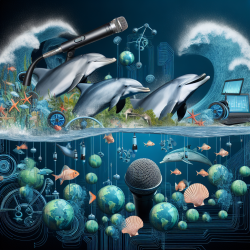Introduction
As a speech-language pathologist, you may wonder how marine conservation technology could possibly relate to your practice. Surprisingly, the recent research article "Power, Politics, and Culture of Marine Conservation Technology in Fisheries" by Jenkins (2022) provides valuable insights that can enhance our understanding of technology's role in any field, including speech-language pathology. By exploring the intersection of technology, society, and the environment, we can draw parallels that encourage innovative approaches in our practice.
Understanding the Social-Ecological-Technological Systems Framework
The research highlights the importance of integrating social sciences into the design and implementation of marine conservation technologies. The Social-Ecological-Technological Systems (SETS) framework is proposed as a means to address the complex interactions between technology, society, and the environment. This framework emphasizes the need for a holistic approach, recognizing that technology is not just a tool but an actor that shapes society and the natural world.
Lessons for Speech-Language Pathologists
So, what can we, as speech-language pathologists, learn from this? Here are some key takeaways:
- Interdisciplinary Collaboration: Just as marine conservation benefits from the integration of social sciences, speech-language pathology can be enriched by collaborating with professionals from other disciplines. Engaging with educators, psychologists, and technologists can lead to more comprehensive and effective interventions for children.
- Contextual Adaptation: The research underscores the importance of adapting technology to fit the cultural and social context. In speech-language pathology, this means tailoring interventions to the unique needs and backgrounds of each child, considering factors such as language, culture, and family dynamics.
- Ethical Considerations: The study highlights the ethical implications of technology use. As practitioners, we must be mindful of the ethical dimensions of our interventions, ensuring that they are equitable and accessible to all children, regardless of their socioeconomic status.
Encouraging Further Research
The research by Jenkins (2022) also calls for further exploration into the societal dimensions of technology. As practitioners, we should be encouraged to conduct our own research, exploring how technological tools can be ethically and effectively integrated into our practice. This could involve studying the impact of teletherapy on diverse populations or investigating the role of technology in enhancing communication outcomes for children with disabilities.
Conclusion
By embracing the lessons from marine conservation technology, speech-language pathologists can enhance their practice, ensuring that interventions are not only effective but also socially and culturally responsive. As we continue to innovate and adapt, let us remain committed to creating positive outcomes for the children we serve.
To read the original research paper, please follow this link: Power, politics, and culture of marine conservation technology in fisheries.










